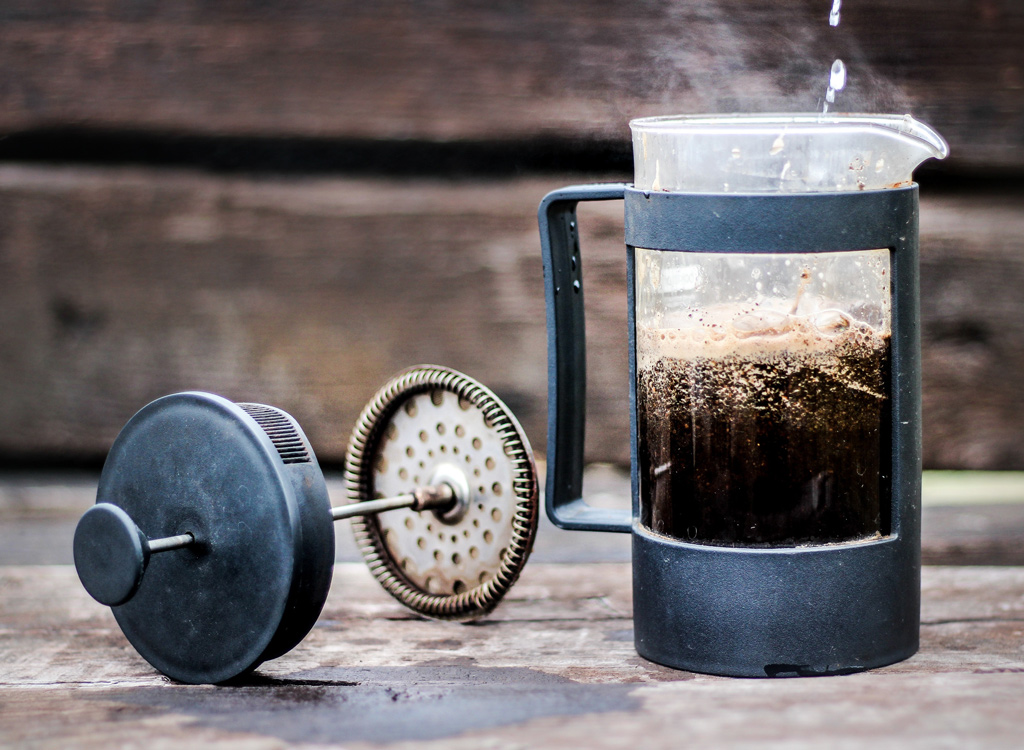The Most Dangerous Way to Drink Your Coffee, According to Science

It's one of the most elegant and environmentally responsible ways to prepare your morning cup of coffee, but if you're regularly using a French press, you could be doing serious damage to your body in the long run, according to a study published in The European Journal of Preventive Cardiology.
"Unfiltered coffee contains substances which increase blood cholesterol," explains study author Dag Thelle, a senior professor in the public health and community medicine department of the University of Gothenburg, Sweden. "Using a filter removes these and makes heart attacks and premature death less likely."
The French press isn't the only form of unfiltered coffee, of course. There are also Greek and Turkish coffees, which are produced by boiling powdered coffee with water that never passes through a filter. All of these types of filter-less coffees "contain higher amounts of cafestol and kahweol—chemicals found in oil droplets floating in the coffee and also in the sediment," Lisa Drayer, RD, told CNN. "Studies have shown that these substances can raise triglyceride levels and LDL cholesterol levels. So stick with filtered coffee, such as a paper filter that you would use in a drip-brewed coffee, which can help to trap these chemicals." (For more dos and don'ts of drinking coffee, make sure you know The Startling Reason Why You Should Never Drink Coffee from a Paper Cup, According to Scientists.)
For the study published in The European Journal of Preventive Cardiology, the researchers set out to investigate whether or not any particular brewing method for coffee was associated with a higher risk of premature death, heart disease, and stroke. All told, more than 500,000 Norwegian adults between the ages of 20 and 79 participated in the study, which required them to fill out surveys for two decades. Over this time period, roughly 12,000 participants died of heart disease, 6,000 died of ischemic heart disease, and almost 3,000 died of stroke.
Ultimately, the researchers discovered that participants who drank their coffee filtered had a 15% less chance of an early death. People who drank between one and four cups every day experienced the lowest rates of mortality overall—and that includes people who didn't drink any coffee at all.
"The finding that those drinking the filtered beverage did a little better than those not drinking coffee at all could not be explained by any other variable such as age, gender, or lifestyle habits," noted Thelle. "So we think this observation is true."
Meanwhile, those who drank unfiltered coffee weren't so lucky. (So if you're using a French press, now could be the time to finally upgrade.) The study's findings on unfiltered coffee square with what a number of health experts have been saying for years about moderate coffee consumption and the resulting health effects.
To learn some of the benefits of drinking filtered coffee (and not too much—stick to the 2015-2020 Dietary Guidelines for Americans' recommendation of no more than 3 to 5 cups of coffee per day), read on, because we've listed some of them below. And for more health advice you can use first thing in the morning, make sure you're up to speed on The Worst Restaurant Breakfasts You Should Never Order.
Coffee can boost your workout

According to a meta-analysis of more than 300 studies on the subject, researchers discovered that caffeine consumption before exercise can boost cardiovascular endurance and enhance strength training. Additionally, a study published in the journal PLOS one specifically noted that coffee increased athletic performance. "Caffeine is particularly helpful for those who work out," Kelli McGrane MS, RD, registered dietitian, once told Eat This! "Caffeine found in coffee has been shown to increase epinephrine levels in your blood as well as stimulate the breakdown of fat making free fatty acids available as fuel. And these two factors together can help fuel and energize your workout."
Coffee will boost your brain health

Coffee has been linked to a decreased risk of Alzheimer's disease and Parkinson's disease in the past, and, according to a study published in the journal Frontiers of Neuroscience, scientists think they know why. When coffee beans are roasted, they produce a set of compounds called phenylindanes, which have been shown to help protect against excessive buildup of proteins in the brain that are thought to play a key role in declining brain function.
Coffee will make you happier

According to a study conducted by the Harvard School of Public Health, drinking coffee was associated with a lower risk of depression in women.
Coffee can help you burn fat

Multiple studies have shown that consuming caffeine is associated with a higher metabolic rate. According to a study published in The American Journal of Clinical Nutrition, caffeine consumption is linked with 10% more fat burn in obese people and upwards of 30% more fat burn in non-obese people. For more on your favorite morning pick-me-up, make sure you're fully up-to-speed on Everything That Happens to Your Body When You Drink Coffee.








